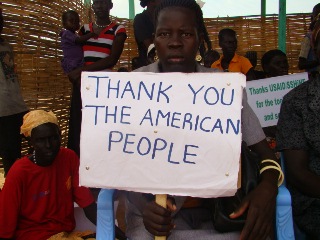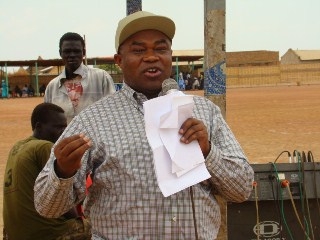S. Sudan’s health and nutrition campaign dispels food insecurity fears
By Julius N. Uma
May 24, 2012 (JUBA) – Achan Tiapi, 45, has for the past two years extensively benefited from the Southern Sudan Health Nutrition and Empowerment (SHiNE) food assistance program, which specifically targets vulnerable women and children in South Sudan’s Warrap and Northern Bahr el Ghazal states.

However, the program co-funded by the United States Agency for International Development (USAID) Sudan Mission, and Food For Peace (FFP) Washington DC will wind up over the next few weeks.
“We still have several problems in our communities. Food insecurity and malnutrition cases are a challenge and is likely to worsen if the program ends in June. I wish the donor can extend the program,” says the 45-year old from Gogrial East County in Warrap state.
Working in close partnership with a consortium of both local and international partners, SHiNE reportedly managed to procure and distribute nearly 2,000 metric tons of food to its beneficiaries in the six targeted counties, with about 13,000 vulnerable women and children successfully reached within two years of program implementation.
Adventist Development and Relief Agency (ADRA) South Sudan, Food for Hungry International (FHI), Malaria Consortium, Concern World Wide and John Hopkins University are the international partners working with SHiNE while the local ones are African Mission Assistance (AMA) in Warrap and Aweil Community Development Organization (ACDO) in Northern Bahr El Ghazal states.
In an interview with Sudan Tribune after last month’s launch of the program’s health and nutrition campaign in Warrap, Idrissa Bernard Kamara, SHiNE’s chief said most of their objectives achieved, the beneficiaries will be expected to impart the skills acquired to empower others in the various communities.

“Initially our strategic objectives were to reduce malnutrition in children under five, decrease prevalence of illnesses, especially childhood diseases and enhance women empowerment within households and communities,” said Kamara, adding that, “Today we can proudly say together with our partners, we have successfully achieved our target.”
Over the last two years, he contends, the health and nutrition of vulnerable women and children under five years of age has greatly improved in six counties of the two states.
In a statement USAID emphasised the importance of sustainable development, adding that by creating long-term community-based structures, the SHiNE program amplified investments and enhance progress in the various communities.
“As the project comes to a close, the health and nutrition campaign will educate beneficiaries on the key messages, which will encourage women and communities to engage in homestead gardening, developing good nutritional habits, seeking health care and employing proper hygiene and sanitation practices,” partly reads the USAID statement.
Already, 40 outpatient therapeutic posts have reportedly been established to take care of the malnourished children who would otherwise not have received adequate care, while nearly 26,000 leaders have been equipped with the requisite knowledge and skills to continue to teach child mothers how to prepare simple and nutritious foods for young children using local ingredients.
Grace Laki, the SHiNE project manager for the two states remains optimistic that the women empowered with knowledge and skills will be able to run homestead vegetable gardens, cultivate fruits trees and further engage in labour-saving skills such as construction of energy efficient stoves.
Currently, food security remains a key government priority in South Sudan, where the United Nations estimates nearly half of the country’s 4.7 million population to be food insecure. Out of this, however, at least one million people are reportedly at the risk of facing severe hunger.
(ST)
